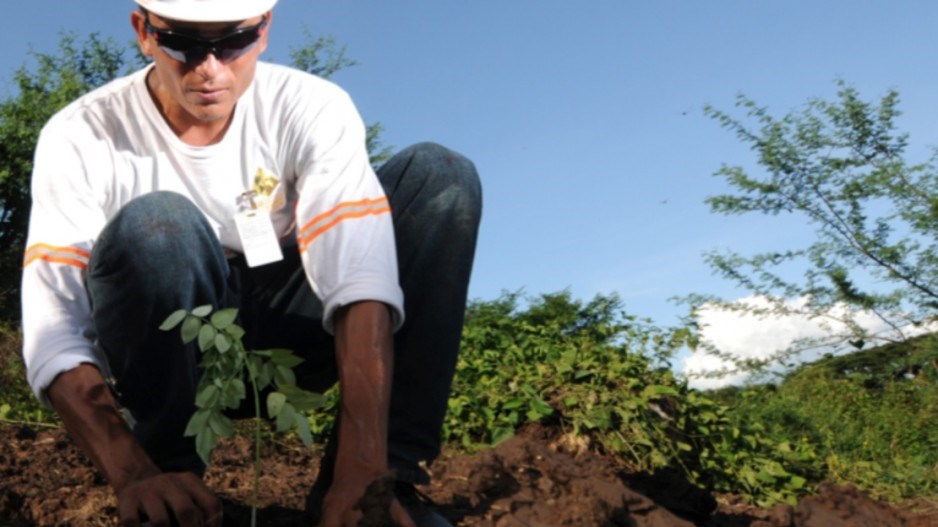Over the years, Canadian mining companies operating overseas in developing countries have earned a bad reputation for their treatment of the environment, workers and local indigenous people.
There have been recent high-profile cases of Canadian mining companies being sued in Canadian courts for alleged violence against protests in Guatemala and alleged use of slave labour in Eritrea.
Less frequently in the headlines are the positive things some Canadian miners are doing in the countries where they operate.
B2Gold Corp. (TSX:BTO), for example, has won a number of awards for its corporate responsibility efforts in Nicaragua, the Philippines, and Namibia, and NexGen Energy Ltd. (TSX:NXE), a Vancouver uranium mine developer, recently won an award from the Prospectors & Developers Association of Canada for social development programs it has initiated in La Loche, Saskatchewan.
Goldcorp Inc. (TSX:G), meanwhile, has invested in medical clinics, mine reclamation and new approaches to reducing the use of water where it operates.
While some of these efforts are intended to address mining’s reputation and to improve social licence, some just make economic sense, said Brent Bergeron, Goldcorp’s executive vice-president of corporate affairs and sustainability.
“There is an aspect of it that’s reputational,” he said. “But I also look at it from the point of view of driving value for our mine sites and being very sensitive to what our communities and what our stakeholders are asking of us.”
B2Gold is one company that has made a serious commitment to corporate responsibility. In Nicaragua, 6,000 residents of the town of La Libertad did not have access to potable water, so the company built a water treatment plant.
It has also developed three tree nurseries in Nicaragua, which have planted a million trees since 2010. The company also built a chilling plant so that local dairy farmers in La Libertad and Santo Domingo can refrigerate their milk and expand their markets.
In the Philippines, the company has built new school buildings and invested in mangrove reforestation and a tuberculosis eradication program. In Namibia, as part of its Otjikoto mine development project, it created a 15,000-hectare nature reserve in an area that had been overgrazed.
And when it acquired the Fekola project in Mali from Australia’s Papillon Resources, the company invested millions to relocate an entire village, even though the permit did not require it.
After the company acquired the Fekola project, B2Gold CEO Clive Johnson said he became concerned when he learned that the village of Fadougou was just 200 metres away from the mine site that it would be developing.
“These were like mud huts with twigs on top,” he said. “There was just no way we were going to be blasting that close to it. We wouldn’t even dream of it, permit or no permit.”
The company met with the villagers and decided to relocate the village about four kilometres away, and gave villagers some basic construction skills training.
“We trained locals in building bricks out of our waste rock,” Johnson said. “They’ve been building all their own homes – really solid brick homes – and we trained some of them in basic electricity. So they were installing solar panels on every roof.”
As for Goldcorp, it operates in areas where water can be scarce, so it has put a lot of effort in recent years into conserving water.
“We’ve been able to get all of our sites – minus one that’s at 40% right now – to 50% recycling of all water,” Bergeron said.
At Goldcorp’s Peñasquito mine in Mexico, the company has helped communities in the area dig new water wells and has provided water treatment.
The company has also invested close to $5 million in a new medical clinic in the community of Cedros.
In Argentina, where it operates the Cerro Negro mine, Goldcorp has been working with the community of Santa Cruz and the Inter-American Development Bank to provide community infrastructure.
Closer to home, NexGen Energy has been making investments around La Loche as part of its Arrow mine project, even though the mine is still years away from being built.
On the environmental side, the company is using a mine design that eliminates the need for tailings ponds, as all the mine waste will be put back underground. But the main reason for the award was the company’s community initiatives. When the company learned that two-thirds of the students at the school in La Loche were going to school hungry – if they went at all – it brought in a Breakfast Club of Canada program.
Travis McPherson, NexGen’s vice-president of corporate development, said the program has provided breakfast for every student in La Loche on every school day for the past two years.
As a result, there have been monthly increases in school attendance and a rise in overall enrolment rates, McPherson said.
And because the goal is to have the mine’s workforce supplied locally, it set up a program to bring students to the mine site to learn about careers in mining and has, to date, provided four students with university scholarships.
When the company learned that the local Humane Society was overwhelmed by stray dogs that were being euthanized, the company set up an adoption program that has, to date, adopted out 30 dogs that otherwise might have been put down. The company also tries to support communities by locally sourcing as many supplies and services as it can. To that end, it has helped some businesses get small-business loans and put business plans together to help them serve the project.




